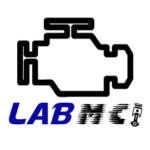Research areas
Research areas
In these research areas engineering applications involving flows with and without chemical reaction (combustion) and heat transfer processes, are analyzed by using numerical and experimental approaches in line with the related undergraduate and graduate courses at UFSC. Part of these research areas are developed in partnership with the Combustion Research Group at Federal University of Santa Catarina, and Rede Nacional de Combustão – RNC – The Brazilian Section of the Combustion Institute.
1. Fuel development and formulation for automotive and civil aviation applications
Fuel formulation and development is one of the most important activities in the development of new technologies for the efficient use of internal combustion engines, maximizing the process of converting the chemical energy contained in the fuel and minimizing the emission of pollutants. In this research area, computational methods are used for the analysis of pure fuels (fuel surrogates) and mixtures of fuel substitutes, in operating like the conditions of automotive engines and aviation turbines.
Main topics:
- Development of detailed kinetics models for fuel surrogates.
- Detailed chemical kinetics of gasoline and aviation kerosene surrogates.
- Ethanol chemical kinetics.
More information Clique aqui (in Portuguese).
2. Experimental methods for fuel analysis
In this research area, experimental methods are used to test and formulate fuels in order to know and improve different aspects of the combustion process in thermal machines (turbines, internal combustion engines, furnaces, combustion chambers, etc.). Experimental parameters of fundamental combustion experiments are obtained and used as reference values for the development of detailed chemical kinetics mechanisms. In cooperation with foreign universities experiments of thermal ignition in high pressure shock tube and rapid compression machine are performed.
Main topics:
- High pressure shock tube.
- Rapid compression machine.
- PSR.
- CVR.
- Internal combustion engine.
More information Clique aqui (in Portuguese).
3. Applied computational fluid dynamics
Computational fluid dynamics (CFD) has been used over the last years as a tool for development, design and execution of major engineering projects. This research area aims to use this tool to optimize equipment (furnaces, burners, internal combustion engines, aviation turbines, etc.) and the best understanding and optimization of fundamental experiments associated with combustion processes. Here, flows with and without chemical reaction (combustion) including heat transfer processes are analyzed.
Main topics:
- Heat flame / structure interaction in burners.
- Shock wave propagation in shock tube experiments.
- Optimization of gas burners for residential furnace applications.
- Optimization of chemical reactors for research in fuel formulation.
- Vehicle aerodynamics.
- Simulation of components and systems in Internal Combustion Engines.
More information Clique aqui (in Portuguese).




